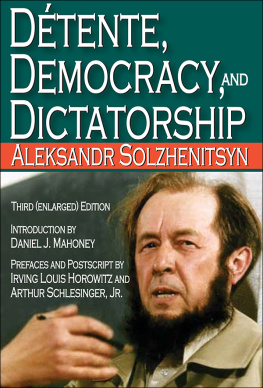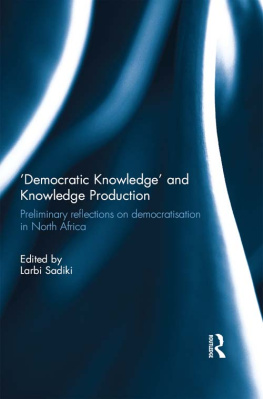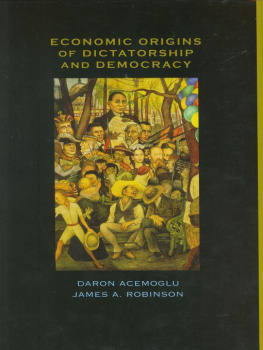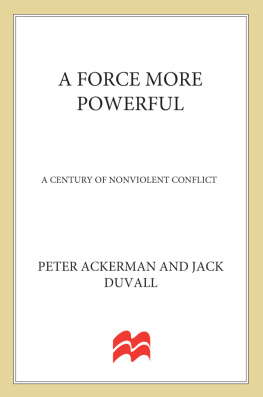FROM DICTATORSHIP TO DEMOCRACY
2002, 2003, 2008, 2010, 2011, 2012 by Gene Sharp
All rights reserved.
No part of this book may be reproduced, in any form, without written permission from the publisher.
Requests for permission to reproduce selections from this book should be mailed to: Permissions Department, The New Press, 38 Greene Street, New York, NY 10013.
From Dictatorship to Democracy was originally published in Bangkok in 1993 by the Committee for the Restoration of Democracy in Burma, in association with Khit Pyaing (The New Era Journal)
Published in the United Kingdom by Serpents Tail, London, 2012
Published in the United States by The New Press, New York, 2012
Distributed by Perseus Distribution
ISBN 978-1-59558-857-9 (pbk.)
CIP data available
Now in its twentieth year, The New Press publishes books that promote and enrich public discussion and understanding of the issues vital to our democracy and to a more equitable world. These books are made possible by the enthusiasm of our readers; the support of a committed group of donors, large and small; the collaboration of our many partners in the independent media and the not-for-profit sector; booksellers, who often hand-sell New Press books; librarians; and above all by our authors.
www.thenewpress.com
24681097531
Contents
Appendix:
The Methods of Nonviolent Action
I HAVE INCURRED SEVERAL DEBTS of gratitude while writing the original edition of this essay. Bruce Jenkins, my Special Assistant in 1993, made an inestimable contribution by his identification of problems in content and presentation. He also made incisive recommendations for more rigorous and clearer presentations of difficult ideas (especially concerning strategy), structural reorganization, and editorial improvements.
I am also grateful for the editorial assistance of Stephen Coady. Dr Christopher Kruegler and Robert Helvey offered very important criticisms and advice. Dr Hazel McFerson and Dr Patricia Parkman provided information on struggles in Africa and Latin America, respectively. However, the analysis and conclusions contained therein are solely my responsibility.
In recent years special guidelines for translations have been developed, primarily due to Jamila Raqibs guidance and to the lessons learned from earlier years. This has been necessary in order to ensure accuracy in languages in which there has earlier been no established clear terminology for this field.
From Dictatorship to Democracy was written at the request of the late U Tin Maung Win, a prominent exiled Burmese democrat who was then editor of Khit Pyaing (The New Era Journal).
The preparation of this text was based on over forty years of research and writing on nonviolent struggle, dictatorships, totalitarian systems, resistance movements, political theory, sociological analysis, and other fields.
I could not write an analysis that had a focus only on Burma, as I did not know Burma well. Therefore, I had to write a generic analysis.
The essay was originally published in installments in Khit Pyaing in Burmese and English in Bangkok, Thailand, in 1993. Afterwards it was issued as a booklet in both languages (1994) and in Burmese again (1996 and 1997). The original booklet editions from Bangkok were issued with the assistance of the Committee for the Restoration of Democracy in Burma.
It was circulated both surreptitiously inside Burma and among exiles and sympathizers elsewhere. This analysis was intended only for use by Burmese democrats and various ethnic groups in Burma that wanted independence from the Burman-dominated central government in Rangoon. (Burmans are the dominant ethnic group in Burma.)
I did not then envisage that the generic focus would make the analysis potentially relevant in any country with an authoritarian or dictatorial government. However, that appears to have been the perception by people who in recent years have sought to translate and distribute it in their languages for their countries. Several persons have reported that it reads as though it was written for their country.
The SLORC military dictatorship in Rangoon wasted no time in denouncing this publication. Heavy attacks were made in 1995 and 1996, and reportedly continued in later years in newspapers, radio, and television. As late as 2005, persons were sentenced to seven-year prison terms merely for being in possession of the banned publication.
Although no efforts were made to promote the publication for use in other countries, translations and distribution of the publication began to spread on their own. A copy of the English-language edition was seen on display in the window of a bookstore in Bangkok by a student from Indonesia, was purchased, and taken back home. There, it was translated into Indonesian, and published in 1997 by a major Indonesian publisher with an introduction by Abdurrahman Wahid. He was then head of Nadhlatul Ulama, the largest Muslim organization in the world, with thirty-five million members, and later President of Indonesia.
During this time, at my office at the Albert Einstein Institution we only had a handful of photocopies from the Bangkok English language booklet. For a few years we had to make copies of it when we had enquiries for which it was relevant. Later, Marek Zelaskiewz, from California, took one of those copies to Belgrade during Miloevis time and gave it to the organization Civic Initiatives. They translated it into Serbian and published it. When we visited Serbia after the collapse of the Miloevi regime we were told that the booklet had been quite influential in the opposition movement.
Also important had been the workshop on nonviolent struggle that Robert Helvey, a retired U.S. Army colonel, had given in Budapest, Hungary, for about twenty Serbian young people on the nature and potential of nonviolent struggle. Helvey also gave them copies of the complete The Politics of Nonviolent Action. These were the people who became the Otpor organization that led the nonviolent struggle that brought down Miloevi.
We usually do not know how awareness of this publication has spread from country to country. Its availability on our website in recent years has been important, but clearly that is not the only factor. Tracing these connections would be a major research project.
From Dictatorship to Democracy is a heavy analysis and is not easy reading. Yet it has been deemed to be important enough for at least twenty-eight translations (as of January 2008) to be prepared, although they required major work and expense.
Translations of this publication in print or on a web site include the following languages: Amharic (Ethiopia), Arabic, Azeri (Azerbaijan), Bahasa Indonesia, Belarusian, Burmese, Chin (Burma), Chinese (simplified and traditional Mandarin), Dhivehi (Maldives), Farsi (Iran), French, Georgian, German, Jing Paw (Burma), Karen (Burma), Khmer (Cambodia), Kurdish, Kyrgyz (Kyrgyzstan), Nepali, Pashto (Afghanistan and Pakistan), Russian, Serbian, Spanish, Tibetan, Tigrinya (Eritrea), Ukrainian, Uzbek (Uzbekistan), and Vietnamese. Several others are in preparation.
Between 1993 and 2002 there were six translations. Between 2003 and 2008 there have been twenty-two.
The great diversity of the societies and languages into which translations have spread support the provisional conclusion that the persons who initially encounter this document have seen its analysis to be relevant to their society.
Gene Sharp
January 2008
Albert Einstein Institution
Boston, Massachusetts
ONE OF MY MAJOR CONCERNS for many years has been how people could prevent and destroy dictatorships. This has been nurtured in part because of a belief that human beings should not be dominated and destroyed by such regimes. That belief has been strengthened by readings on the importance of human freedom, on the nature of dictatorships (from Aristotle to analysts of totalitarianism), and histories of dictatorships (especially the Nazi and Stalinist systems).
Next page







